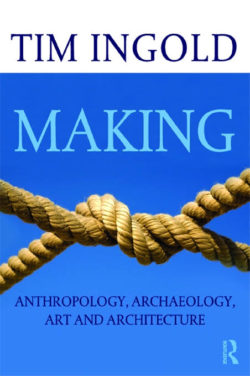Tim Ingold at CePRA 2014

5 March 2014, 10:30 – 16:00
Phil Taylor Cinema, School of Media and Communications
CePRA hosted a workshop and talk by the anthropologist Tim Ingold on March 5th in the “Phil Taylor Cinema” (School of Media and Communications). The event focussed on Ingold’s research into overcoming the distinction between ‘practical’ and ‘intellectual’ craft, and related problems such as the tension between ‘creativity’ and ‘research’, or whether we might think of a new word—not ‘research’, not ‘scholarship’, but something else instead—to describe the generation of new knowledge.
Programme
10:30-12:30 – discussion workshop for practice-research postgraduate students
12:30-1:30 – lunch
2:00-4:00 – Lecture (open to anyone) “Phil Taylor Cinema”, Institute of Communication Studies, Clothworkers Building North
About the Speaker
Tim Ingold’s page at the University of Aberdeen summarises his current research:
“In his latest research he has been exploring three themes, all arising from his earlier work on the perception of the environment, concerning first, the dynamics of pedestrian movement, secondly, the creativity of practice, and thirdly, the linearity of writing. These issues all come together in his current project, funded by a 3-year ESRC Professorial Fellowship (2005-08), entitled ‘Explorations in the comparative anthropology of the line’. Starting from the premise that what walking, observing and writing all have in common is that they proceed along lines of one kind and another, the project seeks to forge a new approach to understanding the relation, in human social life and experience, between movement, knowledge and description. At the same time, and complementing this study, Ingold is researching and teaching on the connections between anthropology, archaeology, art and architecture (the ‘4 As’), conceived as ways of exploring the relations between human beings and the environments they inhabit. Taking an approach radically different from the conventional anthropologies and archaeologies ‘of’ art and of architecture, which treat artworks and buildings as though they were merely objects of analysis, he is looking at ways of bringing together the 4 As on the level of practice, as mutually enhancing ways of engaging with our surroundings.”
http://www.abdn.ac.uk/elphinstone/staff/details.php?id=tim.ingold
Tim Ingold is Professor of Social Anthropology at the University of Aberdeen, and a Fellow of both the British Academy and the Royal Society of Edinburgh. Following 25 years at the University of Manchester, where he was appointed Max Gluckman Professor of Social Anthropology in 1995, Ingold moved in 1999 to Aberdeen, where he went on to establish the UK’s newest Department of Anthropology. Ingold has carried out ethnographic fieldwork among Saami and Finnish people in Lapland, and has written on comparative questions of environment, technology and social organisation in the circumpolar North, as well as on the role of animals in human society, on issues in human ecology, and on evolutionary theory in anthropology, biology and history. In his more recent work, he went on to explore the links between environmental perception and skilled practice. Ingold’s latest research pursues three lines of inquiry that emerged from his earlier work, concerning the dynamics of pedestrian movement, the creativity of practice, and the linearity of writing. He is currently writing and teaching on issues on the interface between anthropology, archaeology, art and architecture. Ingold is the author of many books, including The Perception of the Environment (2000), Lines (2007), Being Alive (2011) and Making (2013).
